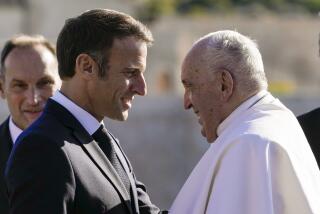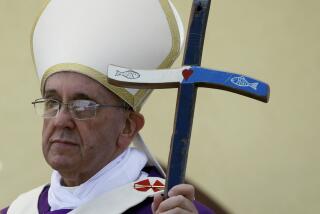Ties between Catholics and Sarkozy fray over Roma deportations
Reporting from Paris — Encouraged in part by outspoken clergy and Pope Benedict XVI, leading figures among France’s Roman Catholic conservatives are distancing themselves from their political ally, President Nicolas Sarkozy, arguing that his policies toward Roma migrants and others fuel racial intolerance.
Already weakened by consistently low popularity ratings, Sarkozy had provoked stiff criticism from opponents on the left, as well as the United Nations, for deporting some Roma and dismantling their camps in the name of crime prevention. On Tuesday, the European Commission against Racism and Intolerance also criticized the president.
Members of Sarkozy’s government have dismissed much of the flak as liberal elitism. But now, experts warn that signs of opposition among Catholic conservatives could hurt his chances for reelection in 2012.
“Today, because of [Sarkozy’s] speech on security, a disenchantment has been instilled” among French Catholics, said Christine Boutin, leader of the Christian Democratic Party, whose members have long been allied with the president’s Union for a Popular Movement.
In comments published Tuesday in the left-leaning daily Liberation, Boutin said members of her party have asked her to end the group’s association with the UMP. She voices support for the pope’s indirect criticism of the president’s policies toward the Roma, who are often referred to as Gypsies.
“Nicolas Sarkozy and the Catholics: le divorce?” questioned an editorial in Le Monde published online Tuesday.
“At the moment, it is evident that there is a degradation of relations between Christians and the government,” Etienne Pinte, a UMP deputy and regular speaker on behalf of conservative Catholics, told Reuters news service. He has threatened to leave the ruling party over the security issue.
A study in July by the Ifop polling service found that 47% of practicing Catholics, traditional supporters of the conservative president, were “satisfied” with Sarkozy. It was a sharp fall from the 61% satisfaction rating Catholics gave him in August of last year.
And though polls early this month showed the president’s approach on the issue pleases a majority of respondents, the pope and other clergy have highlighted “a certain number of troubling things that aren’t necessarily in line with church values,” said Jerome Fourquet, political analyst at the French Ifop polling center.
Speaking in French on Sunday in an apparent swipe at Sarkozy’s policies, which include threatening to strip French nationality from some foreign-born criminals, Benedict urged that people “know how to accept legitimate differences among humans.” The same day, Archbishop of Aix and Arles Christophe Dufour warned that the president’s “security discourse can give the impression there are people who are inferior” in France.
By the end of this month, about 850 Roma are to have been “voluntarily” repatriated to Bulgaria or Romania, their homelands, according to France’s minister of immigration. Both countries are part of the European Union, and home to the largest numbers of Roma in Europe.
Footage of Roma children being evicted from slums or squatter camps and left without alternative housing has been regularly displayed in the French media. As a result, some Catholic voters “are shocked to see images of children forced onto the street,” Fourquet said.
A French priest, Father Arthur Hervet, who has worked in behalf of Roma in the northern city of Lille, said he would return a national medal of honor awarded to him. He told French journalists that he prayed for “Mr. Sarkozy to have a heart attack,” before later saying he regretted his remarks.
Some Catholics, along with many others voters, had already begun turning their backs on Sarkozy over his leadership style. His approach is often viewed as unfairly representative of the wealthy elite and too removed from common preoccupations over unemployment and a sluggish economy, Fourquet said.
As a result, a potential Catholic falling-out with Sarkozy “could free up possibilities” for conservative rivals such as Dominique de Villepin and centrists such as former presidential candidate Francois Bayrou to threaten Sarkozy’s reelection, Fourquet added.
The loss of support has not been across the board, experts say. Some conservative Catholics who see public safety as a top issue remain attached to Sarkozy’s tough-cop policies.
Interior Minister Brice Hortefeux told Europe 1 radio Monday that the government was not “stigmatizing a community” but merely acting on its right to repatriate Romanians and Bulgarians, who are required to have residential permits in order to stay in France longer than three months.
“There is a simple reality in our country, and that is that one has to respect laws,” Hortefeux said. “And the law sees to it that it is forbidden to occupy areas without authorization, in an illegal and illicit manner.”
Lauter is a special correspondent.
More to Read
Sign up for Essential California
The most important California stories and recommendations in your inbox every morning.
You may occasionally receive promotional content from the Los Angeles Times.










